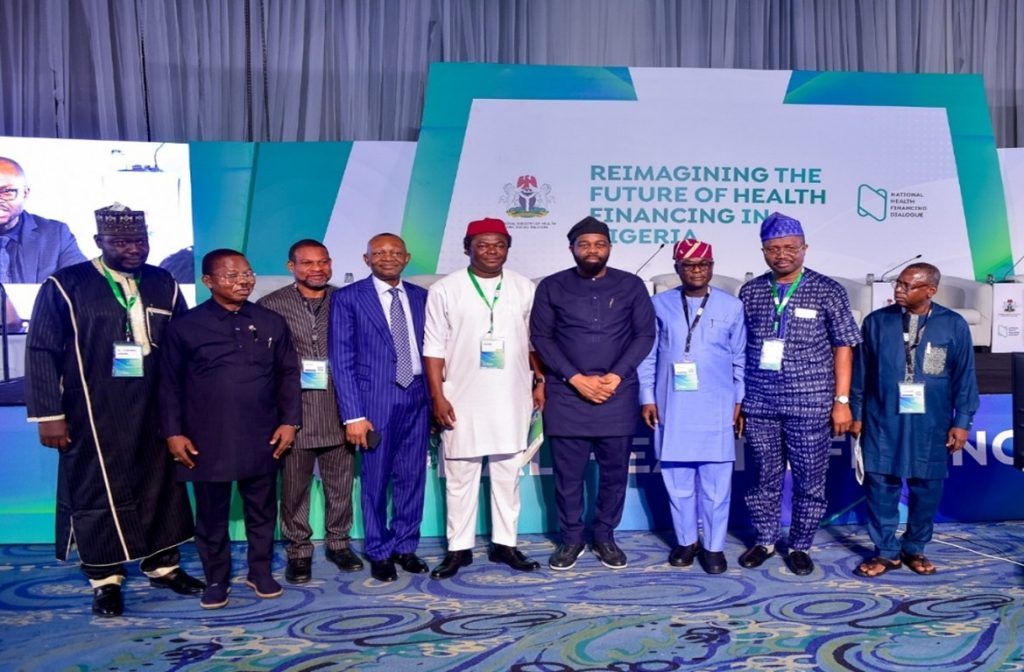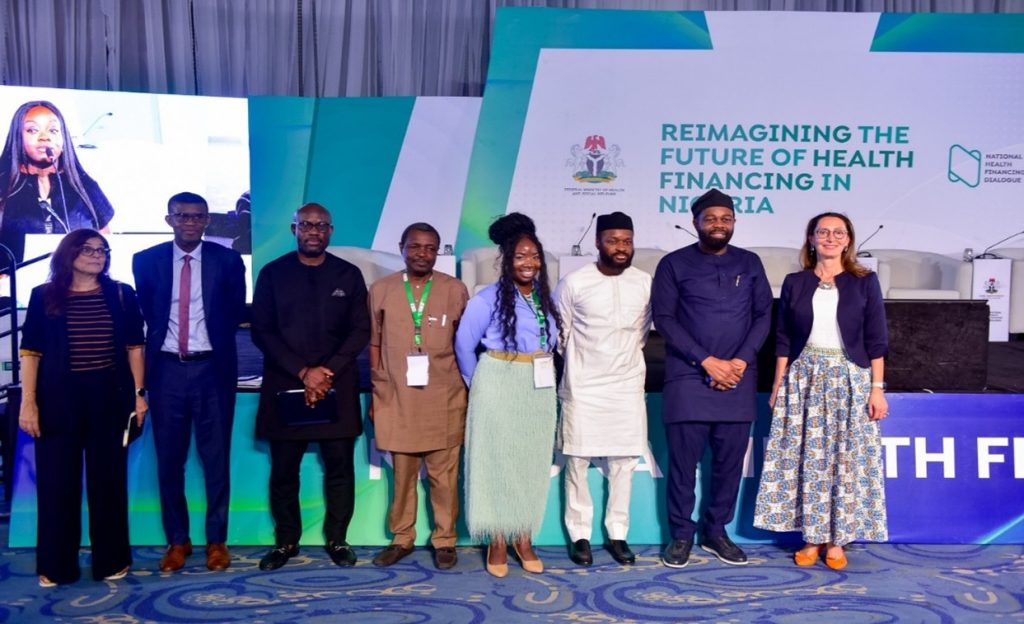
A cross-section of participants at the maiden edition of the National Health Financing Dialogue 2025
Globally, the health financing landscape is shifting, as Official Development Assistance (ODA), which has historically supported health systems, is steadily shrinking. Donor resources are increasingly constrained, transitions are accelerating, and the fiscal space once bolstered by ODA is narrowing. With rising out-of-pocket spending, weak protection for vulnerable groups, and limited subnational funding, Nigeria must take the lead in aligning domestic and external resources with national priorities and long-term strategies.
It was against this backdrop that the maiden edition of the National Health Financing Policy Dialogue 2025, themed “Reimagining the Future of Health Financing in Nigeria,” was convened by the Federal Ministry of Health and Social Welfare with support from national and international partners. The four-day dialogue was held from 1st to 4th September 2025, at the Transcorp Hilton in Abuja. The event brought together a mix of stakeholders from government, private sector, development partners, civil society, academia, local government authorities, policymakers, and global health leaders. It provided a platform to reflect on persistent challenges in Nigeria’s health financing system, explore reform opportunities, and reimagine the country’s health financing architecture to ensure that every naira counts, delivering stronger financial protection and improved health outcomes for all Nigerians. Discussions revolved around four key priorities: advancing accountability and transparency, using evidence to drive policy, unlocking private sector participation, and scaling up domestic health financing reforms.
Enhancing Advocacy and Accountability in Health Financing

L-R: Panellists- Dr. Aminu Magashi, African Health Budget Network; Dr Bolanle Olusola-Faleye (Moderator); Dr Gafar Alawode, Nigeria UHC Forum; HRH Hajia Hauwa Ibrahim Adamu, Wives of FCT Traditional Rulers (AWTR); and Mr Semiye Micheal (DEAN Initiative), Youth Voices.
The sessions underscored the pivotal role of civil society, media, and community groups in promoting transparency, tracking expenditure, and ensuring that health financing decisions reflect the realities of Nigerians at all levels.
At the panel discussion titled “Advancing Accountability in Health Financing: Improving Budget Transparency, Participatory Budgeting and Expenditure Tracking – the role of CSOs in public health”, panellists highlighted civil society organizations (CSOs) as critical partners in advancing accountability through participatory budgeting, expenditure tracking, and community-led monitoring. They also stressed that women, youths, and grassroots groups must be better represented in health financing decisions. However, challenges such as inconsistent CSO engagement in formal health financing processes, such as budget defense and strategic planning, over-reliance on donor support for community-based initiatives, and limited government ownership were identified. Recommendations from the panellists included building CSOs’ capacity to generate, analyze, and effectively use data for evidence-based advocacy and decision making, efficient resource utilization, establishing statutory mechanisms for youth participation, and advocating for government contributions to ensure sustainability and reduce over-reliance on donor funding for community-based initiatives.
The role of the media also featured prominently in another panel session titled “Leveraging media as a strategic tool for transparency and accountability in driving domestic resource mobilisation for health”. Panellists discussed how journalists and media organizations can act as accountability partners and help by simplifying complex financing concepts through innovative storytelling, providing platforms for citizen feedback, and using investigative journalism constructively to highlight gaps and inform government action.
Strengthening the Use of Evidence for Healthcare Financing and Policy

L-R: Dr. Nkata Chuku, Managing Principal, Health Systems Consult ltd (moderator); Prof Chigozie J Uneke, Prof of Health Systems, Vice Chancellor, David Umahi Federal University Teaching Hospital; Dr Kamil Shoretire, Director, Research, Policy and Statistics, FMoH; Ms Susna De, Deputy Director Gates Foundation; Dr Chisom Obi, Brooks Insights; Dr Robert Marten, Alliance for Health Policy and Systems Research, WHO; Mr Samuel Igbagaav, Chief Statistician, Social Statistics Division, NBS.
The Policy Dialogue also spotlighted the role of research, learning, and collaboration in shaping health financing policy. Speakers emphasized that financing health is not only about raising more money but also about how services are organized, delivered, and made accessible to citizens.
The dialogue also emphasized bridging the “know-do gap,” noting that while Nigerian universities and researchers generate significant knowledge, these outputs rarely influence policy because they are not aligned with national priorities. Speakers proposed a National Health Research Fund to prioritize policy-relevant studies, a Health Financing Observatory to enhance data access and use, and stronger partnerships between academia, government, and development partners.
Unlocking Private Sector Investments in Healthcare
The panel session titled “Critical Issues in Financing Healthcare – Stakeholder Perspectives” featured panellists who highlighted the urgent need to unlock private sector investments in Nigeria’s health sector. This underscores the fact that government alone cannot meet the scale of demand and must act as a steward by creating an enabling environment grounded in strong governance and balanced regulation for sustainable health financing.
With private providers already delivering nearly 70% of health services, panellists called for expanded health insurance to reduce out-of-pocket costs and attract new investments. Examples such as NSIA’s cancer centre investments and Bank of Industry’s financing tools showcased how capital can strengthen healthcare delivery. Government reforms, including tariff waivers on health manufacturing inputs and PVAC’s target of 70% local production by 2030, are expected to reduce Nigeria’s $1–2 billion annual medical tourism bill and conserve the much-needed foreign exchange. Commitments included creating a Health Impact Investment Fund, scaling digital health innovations, enhancing regulation, and positioning private sector participation to build a resilient and inclusive health system.

L-R: Dr. Njide Ndili, Chairperson, Healthcare Federation of Nigeria (moderator); Mr Uchenna Mkparu, Chief Investment Officer, United Capital Infrastructure Fund; Dr Anne Ada-Ogoh, Director, Policy, PSHAN; Dr Clare Omatseye, CEO, JNCI; Dr Gideon Anumba, COO, Leadway Health HMO; Chishamiso Mawayo, Senior Investment Officer, IFC; Funke Falade, NSIA; Mr Dapo Akinsanya, CFO, AfYA Care Nigeria.
Turning Health Commitments into Tangible Impact through Government Action and Partner Collaboration
The Conference also turned the spotlight on the sub-national level, examining how health financing commitments can be translated into tangible outcomes for Nigerians. Stakeholders emphasized the pivotal role of state and local governments in achieving Universal Health Coverage (UHC).
Central to the discussions was the Basic Health Care Provision Fund (BHCPF), through which more than ₦194 billion has been disbursed to over 8,300 facilities and health insurance has been expanded to 2.6 million Nigerians since 2019. Under the BHCPF 2.0 reforms, fund flows are now digitized, allocations are performance-based, and transparency measures are being strengthened. Despite these gains, gaps persist as states’ compliance with counterpart funding requirements remains weak.
Local government leaders, under the Association of Local Governments of Nigeria (ALGON), pledged to prioritize health alongside agriculture, WASH, and nutrition, while calling for greater grassroots allocations. The SSHIAs showcased progress in enrolling vulnerable groups and introducing digital claims processing, but highlighted challenges such as unaffordable premiums, limited benefit packages, and weak enforcement of mandatory enrolment.

L-R: Dr. Muhammed Safana, CEO, Katsina SHIA; Dr, Agadah Zuoboemi, ES Bayelsa SHIA, Frank Aigbogun, CEO, BusinessDay; Dr. Uchenna Ewelike, ES Imo SHIA; Dr Kelechi Ohiri, Director General NHIA and Chair- Health Financing TWG; Dr. Afolabi Dosunmu, ES Ogun SHIA, Dr. Oyeneyin Abiodun, ES Ondo SHIA; Prof. Kenneth Kove, ES SHIA.
Strategic Health Investments in an Era of Transitioning Development Assistance
The dialogue extensively discussed the reality of declining donor support under the theme “Strategic Health Investments in an Era of Transitioning Development Assistance.” Participants examined how Nigeria can navigate shrinking aid flows while building a resilient, country-owned health financing system. The Sector-Wide Approach (SWAp) was highlighted as a key tool for consolidating reforms, aligning resources, and strengthening accountability across all levels of government.
Global experts warned of risks from abrupt donor transitions and shared lessons from other regions on integrating aid into domestic systems. With aid projected to fall by up to 40 per cent, panellists agreed that political commitment, transparent transition processes, and redefining donor roles as technical partners will be critical for sustainability.
A landmark Presidential directive mandating the enforcement of the NHIA Act (2022) across all government ministries, departments, and agencies was announced. Under the new circular, employers must enroll their staff under NHIA-accredited insurance plans. Also, procurement compliance will require valid NHIA documentation, and a digital verification platform will be established to ensure accountability. This directive is expected to significantly expand insurance coverage, protect workers from catastrophic health expenditures, and strengthen compliance across both public and private sectors.

L-R: Prof Leila Ben Amor Mathieu, Head of Cooperation, EU Delegation to Nigeria and ECOWAS; Dr Moussa Dieng, Senior Health Economist, World Bank; Uche Amaonwu, Gates Foundation (moderator); Gregory Osubor, Principal Social Development Specialist, AfDB; Funmi Adesanya, United States Government, Health Assistance Office; Dr. Muntaqa Umar-Sadiq, SWAp Coordination Office; Dr Kelechi Ohiri, Director General NHIA; Ms Maria Kirova, Head of Africa, The Global Fund
From Dialogue to Action
The concluding session of the policy dialogue marked a turning point as the federal government declared health financing a sovereign, strategic, and economic priority under the Renewed Hope Agenda. Development partners and the African Union reinforced Nigeria’s continental role, with AU leaders noting that “if Nigeria gets it right, Africa will get it right.”
The Minister of Finance, Wale Edun highlighted that reforms such as subsidy removal, stronger reserves, and macroeconomic stability are already freeing up fiscal space for social investments, including health. Other policymakers laid out Nigeria’s path forward. The Minister of Budget and Economic Planning, Senator Abubakar Atiku Bagudu announced plans to raise the revenue-to-GDP ratio, expand health allocations, and attract private capital, while the Chair, Senate Health Committee, Senator Ipalibo Harry Banigo reaffirmed legislative commitment, pointing to appropriations for HIV treatment, immunization, and the Vulnerable Group Fund, alongside innovations like a digital budget dashboard for transparency.
Building on this, Dr. Taiwo Oyedele, the Chair of the Presidential Fiscal Policy and Tax Reforms Committee, outlined mechanisms to expand fiscal space for health, including “sin taxes” on tobacco, alcohol, and carbon emissions, statutory contributions, deductible donations, and incentives for impact investment in health infrastructure and services. He also revealed that a strategy is in the pipeline to earmark a proportion of health taxes directly for the health sector.
In addition, Prof. Muhammed Pate, the Coordinating Minister of Health and Social Welfare, emphasized that the dialogue must not be “a talk shop” but a launchpad for measurable and sustainable commitments. He highlighted key milestones, including enrolling over 20 million Nigerians in health insurance with a target of 44 million by 2030, expanding the Vulnerable Groups Fund, and launching the Catastrophic Health Insurance Fund. He also touched on fiscal reforms aimed at unlocking new investment in health, stronger partnerships in local manufacturing and service delivery, and a renewed focus on accountability, data, and innovation to drive results.

A cross section of participants after the fireside chat with the Prof. Muhammed Pate, Minister of Health; Sen. Dr. Ipalibo Harry Banigo, Chairman Senate Committee on Health (secondary and tertiary).
Across four days of dialogue, a clear roadmap emerged: Nigeria must scale up domestic resource mobilization, expand health insurance, unlock private sector investment, and strengthen accountability at all levels. The commitments made, anchored on shared responsibility between federal, state, and local governments, supported by partners and the private sector, position Nigeria to build a health financing system that is inclusive, sustainable, and resilient.
Comments are closed.